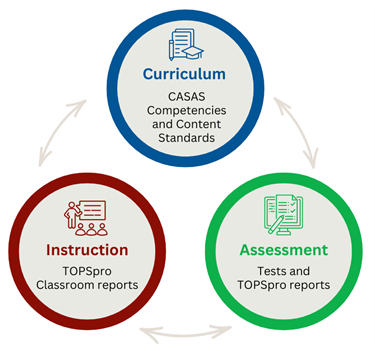CASAS Competencies
The CASAS Competencies along with the CASAS Content Standards form the basis of the CASAS integrated assessment and curriculum management system.
The CASAS Competencies identify more than 360 essential life skills that youth and adults need to be functionally competent members of their community, their family, and the workforce.
The CASAS Content Standards identify the underlying reading, listening, and math basic skills at specific proficiency levels that should be taught in the context of CASAS Competencies.
The competencies are relevant across the full range of instructional levels, from beginning literacy through high school completion including transition to postsecondary education and training.
They cover nine broad content areas:
- Basic Communication
- Community Resources
- Consumer Economics
- Health
- Employment
- Government and Law
- Math
- Learning and Thinking Skills
- Independent Living
The competencies provide instructional objectives, direct links to test content for monitoring learning, criteria for program evaluation, and a reference system for instructional materials.
Based on field research – which began in 1980 – and recommendations from educators, learners, business and industry representatives, and community-based agencies, the competencies are regularly updated and validated at state and national levels. Studies conducted in several states show strong links between CASAS Competencies and learner needs. CASAS is a standards-based system correlated to national and state-level standards .
Using CASAS competencies in curriculum, assessment, and instruction
Our tests measure reading, math, listening, speaking, and writing skills in contexts of everyday situations. Results provide feedback to learners and instructors. Incorporating CASAS Competencies and Content Standards into curriculum and using our system can help better meet learner, community, and program needs and fulfill federal, state, and local reporting requirements.
The CASAS resource QuickSearch lists more than 2,800 print and computer-based instructional materials and correlates them to CASAS Competencies, thus allowing educators to identify materials that target specific learning needs at appropriate instructional levels.